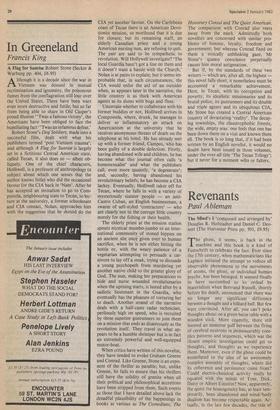In Greeneland
Francis King
A Flag for Sunrise Robert Stone (Seeker & Warburg pp. 404, £6.95)
Although it is a decade since the war in Vietnam was doused in mutual recrimination and ignominy, the poisonous fumes from the conflagration still lour over the United States. There have been wars even more destructive and futile; but so far from being able to share in Old Casper's proud illusion "Twas a famous victory', the Americans have been obliged to face the humiliating fact "Twas an infamous defeat.'
Robert Stone's Dog Soldiers, made into a successful film, dealt with what his publishers termed 'post Vietnam trauma'; and although A Flag for Sunrise is largely set in a fictitious Central American state, called Tecan, it also does so — albeit ob- liquely. One of the chief characters, Holliwell, is a professor of anthropology (a subject about which one senses that the author knows little) who did the occasional favour for the CIA back in `Nam'. After he has accepted an invitation to go to Corn- postela, neighbouring state to Tecan, to lec- ture at the university, a former schoolmate and CIA contact, Nolan, approaches him with the suggestion that he should do the
CIA yet another favour. On the Caribbean coast of Tecan there is an American Devo- tionist mission, so moribund that it is due for closure; but its remaining staff, an elderly Canadian priest and a young American nursing nun, are refusing to quit. The pair are said to be sympathetic to revolution. Will Hollywell investigate? 'The local Guardia hasn't got a line on them and it doesn't want a hassle with the Church,' Nolan is at pains to explain; but it seems im- probable that, in such circumstances, the CIA would enlist the aid of an outsider when, as appears later in the narrative, the little country is as thick with American agents as its slums with bugs and fleas.
Uncertain whether to collaborate with his former buddies or not, Holliwell arrives in Compostela, where, drunk, he manages to deliver so inflammatory an attack on Americanism at the university that he receives anonymous threats of death on the telephone at his hotel. He has already met up with a former friend, Campos, who has been guilty of a double defection. Firstly, having abandoned wife and children, he has become what this journal often calls 'a homosexualist' and what the publishers call, even more quaintly, 'a degenerate'; and, secondly, having abandoned his revolutionary beliefs, he has become a CIA lackey. Eventually, Holliwell takes off for Tecan, where he falls in with a variety of mysteriously sinister people — an anti- Castro Cuban, an English businessman, a swarm of self-styled 'contractors' — who are clearly not in the corrupt little country merely for the fishing or their health.
The elderly priest at the mission station spouts mystical mumbo-jumbo to an inter- national community of stoned hippies on an ancient site once given over to human sacrifice, when he is not either hitting the bottle or, with the weary patience of a vegetarian attempting to persuade a car- nivore to lay off a steak, trying to dissuade a young psychopath from murdering yet another native child to the greater glory of God. The nun, making her preparations to hide and nurse wounded revolutionaries when the uprising starts, is lusted after by a sadistic lieutenant in the Guardia, who eventually has the pleasure of torturing her to death. Another strand of the narrative deals with a half-caste radar technician, perilously high on speed, who is recruited by three superior gunrunners to join them on a mission that ends as disastrously as the revolution itself. They travel in what ap- pears to be a humble shrimper but is in fact an extremely powerful and well-equipped motor-boat.
When critics have written of this novelist, they have tended to evoke Graham Greene and Conrad. Like Greene, Stone is an expo- nent of the thriller as parable; but, unlike Greene, he fails to ensure that his thrillers still have the solidity of granite when all their political and philosophical accretions have been stripped from them. Such events as those that I have detailed above lack the dreadful plausibility of the happenings in books as various as The Comedians, The
Honorary Consul and The Quiet American. The comparison with Conrad also veers away from the mark. Admittedly both novelists are concerned with similar pro- blems of honour, loyalty, freedom and government; but whereas Conrad fixed on them a stoically unblinking gaze, Mr Stone's queasy conscience perpetually causes him moral astigmatism.
But if, by the standards of these two writers — which are, after all, the highest this novel falls short, it nonetheless must be accounted a remarkable achievement. Here, in Tecan, with its corruption and poverty, its idealistic missionaries and its brutal police, its gunrunners and its double and triple agents and its ubiquitous CIA, Mr Stone has created a Central American country of devastating 'reality'. The decay- ing townships, the claustrophobic forests, the wide, empty seas: one feels that one has been down there on a visit and known them all. The book is so long that, if it had been written by an English novelist, it would no doubt have been issued in three volumes, under the over-all title 'The Tecan Trilogy'; but it never for a moment wilts or falters.


































 Previous page
Previous page